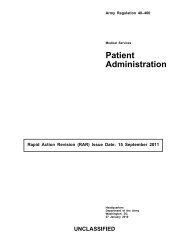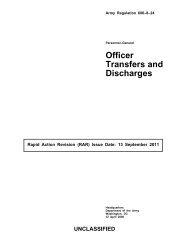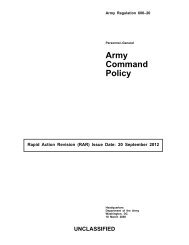Care and Disposition of Remains - Army Publishing Directorate ...
Care and Disposition of Remains - Army Publishing Directorate ...
Care and Disposition of Remains - Army Publishing Directorate ...
Create successful ePaper yourself
Turn your PDF publications into a flip-book with our unique Google optimized e-Paper software.
will be paid from IMET funds only for deceased FMTs from countries for which travel costs are defrayed from IMET<br />
funds. For transportation to a country that defrays all or part <strong>of</strong> an FMT’s travel costs, the country concerned must<br />
arrange <strong>and</strong> pay for that portion, either through the country liaison <strong>of</strong>ficer or <strong>of</strong>ficial foreign government representative.<br />
(3) Per diem <strong>and</strong> travel costs <strong>of</strong> the escort accompanying remains <strong>of</strong> an IMET FMT within the United States are<br />
chargeable to IMET funds. The training facility responsible for preparation <strong>and</strong> transportation <strong>of</strong> the remains will<br />
contact the CDR, SATFA (ATFA–P), for proper accounting classification.<br />
c. Death <strong>of</strong> a Foreign Military Sales FMT.<br />
(1) Expenses involved in the death <strong>of</strong> Foreign Military Sales (FMS) FMTs are the responsibility <strong>of</strong> the foreign<br />
government; however, the activity concerned will <strong>of</strong>fer all assistance possible. If the assistance <strong>of</strong> the CAC is desired<br />
by the foreign government, that <strong>of</strong>ficer will, without charge <strong>and</strong> as a matter <strong>of</strong> courtesy, negotiate with a civilian<br />
mortuary on behalf <strong>of</strong> the foreign government for preparation <strong>of</strong> the remains for burial or shipment. No payment for<br />
services rendered locally will be made by the U.S. Government. All incident charges are the responsibility <strong>of</strong> the<br />
foreign government. The purchasing <strong>and</strong> contracting <strong>of</strong>ficer will advise the civilian mortuary concerned to submit<br />
invoices covering all associated costs to the appropriate foreign embassy representative in Washington, DC.<br />
(2) Travel <strong>and</strong> transportation expenses for escorts accompanying the remains <strong>of</strong> an FMS FMT will be paid by the<br />
foreign government concerned.<br />
d. Death <strong>of</strong> other U.S. agency-sponsored FMTs. Death <strong>of</strong> other U.S. agency-sponsored FMTs will be h<strong>and</strong>led by the<br />
sponsoring agency.<br />
3–11. FMTs authorized accompanying dependents<br />
Expenses for an authorized FMT to accompany a dependent <strong>of</strong> a deceased FMT are the responsibility <strong>of</strong> the FMT or<br />
the foreign government. These expenses will be h<strong>and</strong>led in the same manner as stated in paragraph 3–10c(1).<br />
Chapter 4<br />
<strong>Disposition</strong> <strong>of</strong> <strong>Remains</strong><br />
4–1. Working with local civil authorities<br />
Good working relationships with local civil authorities <strong>and</strong> Department <strong>of</strong> Veterans’ Affairs activities will be established<br />
<strong>and</strong> maintained by each CAC. Such relationships are important when death <strong>of</strong> a soldier occurs <strong>of</strong>f the military<br />
installation. The CAC should maintain a liaison with the medical examiners, law enforcement agencies, medical<br />
treatment facility administrators, <strong>and</strong> so forth.<br />
4–2. Casualty notification <strong>and</strong> casualty assistance<br />
The normal course <strong>of</strong> action in h<strong>and</strong>ling remains, regardless <strong>of</strong> the place <strong>of</strong> death, is as follows:<br />
a. Medical authorities must <strong>of</strong>ficially pronounce the person dead <strong>and</strong> issue a death certificate.<br />
b. The CAC comm<strong>and</strong>er will appoint a notifier to notify the PADD <strong>of</strong> the death <strong>and</strong> advise the CAC responsible for<br />
providing primary care for the remains, <strong>and</strong> CAO when this has been done.<br />
c. The CAC comm<strong>and</strong>er will appoint a casualty assistance <strong>of</strong>ficer (CAO) for the PADD, PERE, <strong>and</strong> other persons<br />
eligible or entitled to a mortuary affairs benefit.<br />
4–3. Communicating with the PADD<br />
Communications necessary for proper disposition <strong>of</strong> deceased personnel covered by this regulation are authorized.<br />
Persons in contact with the PADD will be kind, considerate, sympathetic, <strong>and</strong> polite at all times.<br />
4–4. Person authorized to direct disposition <strong>of</strong> remains<br />
a. Only one person at a time can be the PADD. Accordingly the order <strong>of</strong> priority listed in (1) through (12) below<br />
will be followed in determining the PADD for eligible deceased personnel cited in chapter 2. The PADD can only be<br />
disqualified in accordance with the criteria found in paragraph 4–8.<br />
(1) Surviving spouse, even if a minor. For this regulation, the legal spouse is one who is married as prescribed by<br />
civil law or was not divorced from the deceased <strong>and</strong> has not remarried at the time disposition <strong>of</strong> remains is to be made.<br />
The latter would apply to the case <strong>of</strong> a soldier who has been declared deceased, body not recovered at the time <strong>of</strong> the<br />
casualty incident, <strong>and</strong> whose remains are later recovered <strong>and</strong> identified. If the spouse has remarried at the time<br />
disposition is to be made, the right <strong>of</strong> disposition will go to the next person in order <strong>of</strong> priority (see para 4–26).<br />
(2) Designated blood relative. An unmarried soldier may designate a blood relative on DD Form 93 (Record <strong>of</strong><br />
Emergency Data) as his or her PADD. If the soldier’s parents are divorced or separated, the soldier may designate<br />
which blood relative will direct disposition <strong>of</strong> the remains. Should the soldier subsequently marry <strong>and</strong> be survived by a<br />
spouse, the provisions <strong>of</strong> (1) above will apply.<br />
(3) Sons or daughters who have reached the age <strong>of</strong> majority in the order <strong>of</strong> seniority (age).<br />
26 AR 638–2 22 December 2000
















